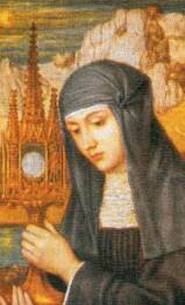
Juliana was a daughter of the noble family of the Falconieri, and was born in the year 1270. Her father was the same who at his own costs so splendidly built from the foundations the Church of Our Lady of the Annunciation as it now standeth at Florence. Her mother's name was Reguardata. They were both well stricken in years, and, until the birth of Juliana, had been childless. From her very cradle, she gave tokens of the holiness of life to which she afterwards attained. And from the murmuring of her baby lips was caught the sweet sounds of the names of Jesus and Mary. As she entered on her girlhood, she delivered herself up entirely to the pursuit of Christian godliness, and so excellently shone therein, that her uncle, the Blessed Alexius, scrupled not to tell her mother that she had given birth to an Angel rather than to a woman.
So modest was her carriage, and so clean her soul from the lightest speck of indiscretion, that she never in her whole life stared a man in the face, and that the very mention of sin made her shiver, and when the story of a grievous crime was told her, she dropped down nearly fainting. Before she had finished her fifteenth year, she renounced her inheritance, although a rich one, and all prospect of an earthly marriage, and made to God a vow of virginity, before holy Philip Beniti, from whom she was the first to receive the religious habit of what are called the Mantellate Nuns.
Many young women of noble families followed the example of Juliana, and even her own mother put herself for instruction under her daughter. Thus in a little while their number increased, and she became the foundress of the Order of Mantellate Nuns, who whom she gave a rule of life full of wisdom and godliness. Holy Philip Beniti, having thorough knowledge of her excellence, chose her above all living to whom at his death to leave the care not of the women only but of the whole of the Servite Order, of which he had been the propagator and director. Juliana, who deemed very lowly of herself, even when she was the mistress of the others, ministered to her sisters in the meanest offices of the work of the house. She passed whole days in incessant prayer, and was often rapt in spirit, and the remainder of her time she toiled to make peace among the citizens, who were at variance together, to recall transgressors from the ways of iniquity, and to nurse the sick, to cure whom she would sometimes even use her tongue to remove the matter that ran from their sores. It was her custom to afflict her own body with whips, knotted cords, iron girdles, watching, and sleeping upon the ground. Upon Mondays, Tuesdays, Wednesdays, and Thursdays, she ate very sparingly some unpalatable food, upon Fridays she took nothing except the Bread of Angels, and upon Saturdays, besides the Holy Communion, only bread and water.
The self-inflicted hardships of her life brought upon her a disease of the stomach, whereby, when she was seventy years of age, she was brought to the point of death. She bore the daily sufferings of her illness with a smiling face and a brave heart. The only thing of which she was heard to complain was that, her stomach being so weak that she could not keep down any food, she was withheld by reverence for the Sacrament from drawing near to the Lord's Table. Finding herself in these straits she begged the Priest to bring the Bread of God, and, as she dared not take it into her mouth, to put it as near as possible to her heart. The Priest did as she wished, and, to the amazement of all present, the Divine Bread at once disappeared from sight, and at the same instant a smile of joyous peace crossed the face of Juliana, and she gave up the ghost. All were confounded until the virgin body was being laid out after death in the accustomed manner. Then there was found upon the left side of the bosom a mark like the stamp of a seal, reproducing the form of the Sacred Host, the mould of which was one of those that bear a figure of Christ crucified. The noise of this and other wonders got for Juliana a reverence not only from Florence, but from all parts of the world, which so increased through the course of four hundred years, that Pope Benedict XIII commanded an office in her honour to be said by the whole Order of Servants of the Blessed Virgin Mary, and Clement XII, a munificent Protector of the same Order, finding new signs and wonders shedding lustre upon her memory every day, numbered her among the Holy Virgins.




